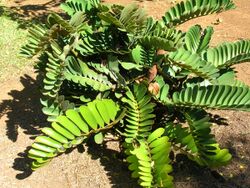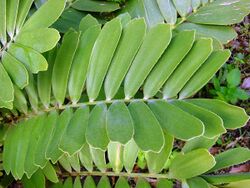Biology:Zamia
| Zamia | |
|---|---|

| |
| Zamia furfuracea | |
| Scientific classification | |
| Kingdom: | Plantae |
| Clade: | Tracheophytes |
| Clade: | Gymnospermae |
| Division: | Cycadophyta |
| Class: | Cycadopsida |
| Order: | Cycadales |
| Family: | Zamiaceae |
| Subtribe: | Zamiinae |
| Genus: | Zamia L.[1] |
| Type species | |
| Zamia pumila | |
| Synonyms[2] | |
| |
Zamia is a genus of cycad of the family Zamiaceae, native to North America from the United States (in Georgia and Florida) throughout the West Indies, Central America, and South America as far south as Bolivia.[2][3][4][5] The genus is considered to be the most ecologically and morphologically diverse of the cycads, and is estimated to have originated about 68.3 million years ago.[6]
Description
The genus comprises deciduous shrubs with aerial or subterranean circular stems, often superficially resembling palms. They produce spirally arranged, pinnate leaves which are pubescent, at least when young, having branched and simple, transparent and coloured hairs. The articulated leaflets lack a midrib, and are broad with subparallel dichotomous venation. Lower leaflets are not reduced to spines, though the petioles often have prickles. The emerging leaves of many Zamia species are striking, some emerging with a reddish or bronze cast (Z. roeslii being an example). Zamia picta is even more distinctive, being the only truly variegated cycad (having whitish/yellow speckles on the leaves).[7]
Reproduction
Zamia sporophylls are born in vertical rows in cones, and the megasporophyll apices are faceted or flattened, not spinose. The fleshy seeds are subglobular to oblong or ellipsoidal, and are red, orange, yellow or rarely white. The endosperm is haploid, derived from the female gametophyte. The embryo is straight, with two cotyledons that are usually united at the tips and a very long, spirally twisted suspensor. The sperm of members from the genus are large, as is typical of cycads, and Z. roezlii is an example; its sperm are approximately 0.4 mm long and can be seen by the unaided eye.[8]
Preferred habitat
All the species of Zamia produce leafy crowns of foliage that make them choice garden specimens and most varieties branch heavily in age to produce handsome clumps. With a few exceptions, most Zamia species are found in warm, humid, tropical rainforest habitats, growing in the forest understory. However, many species are still fairly adaptable, performing quite well in cultivation, especially in subtropical areas. All species need good drainage and protection from the cold.
Ecology
At least one species, Z. pseudoparasitica, grows as an epiphyte in the branches of trees.
Species
Accepted species:[9]
| Phylogeny of Zamia[10][11] | |||||||||||||||||||||||||||||||||||||||||||||||||||||||||||||||||||||||||||||||||||||||||||||||||||||||||||||||||||||||||||||||||||||||||||||||||||||||||||||||||||||||||||||||||||||||||||||||||||||||||||||||||||||||||||||||||||||||||||||||||||||||||||||||||||||||||||||||||||||||
|
- Zamia acuminata Oerst.ex Dyer - Costa Rica, Nicaragua, Panama
- Zamia amazonum D.W.Stev. - Venezuela, Colombia, Ecuador, Peru, Brazil
- Zamia amplifolia Hort.Bull ex Mast. - Colombia
- Zamia angustifolia Jacq. - The Bahamas, Cuba
- Zamia boliviana (Brongn.) A.DC. - Bolivia, Brazil (Mato Grosso)
- Zamia bussellii Schutzman et al.
- Zamia chigua Seem. - Colombia
- Zamia cremnophila Vovides, Schutzman & Dehgan - Tabasco, Mexico
- Zamia cunaria Dressler & D.W.Stev. - Panama
- Zamia decumbens Calonje, Meerman, M.P. Griff. & Hoese - Belize
- Zamia disodon D.W.Stev. & Sabato - Colombia
- Zamia dressleri D.W.Stev. - Panama
- Zamia elegantissima Schutzman, Vovides & R.S.Adams - Panama
- Zamia encephalartoides D.W. Stev. - Colombia
- Zamia erosa O.F.Cook & G.N.Collins - Cuba, Jamaica, Puerto Rico
- Zamia fairchildiana L.D.Gómez - Panama, Costa Rica
- Zamia fischeri Miq. ex Lem. - Mexico (San Luis Potosí, Veracruz, Hidalgo, Querétaro, Tamaulipas)
- Zamia furfuracea L.f. - cardboard palm - Mexico (Veracruz)
- Zamia gentryi Dodson Ecuador
- Zamia gomeziana R.H.Acuña - Costa Rica
- Zamia grijalvensis Pérez-Farr., Vovides & Mart.-Camilo - Mexico (Chiapas)
- Zamia hamannii A.S.Taylor, J.L.Haynes & Holzman - Panama
- Zamia herrerae Calderón & Standl. - Mexico (Chiapas), El Salvador, Guatemala, Nicaragua, Honduras
- Zamia huilensis Calonje, H.E.Esquivel & D.W.Stev. Colombia
- Zamia hymenophyllidia D.W.Stev. - Colombia, Peru
- Zamia imbricata Calonje & Castro
- Zamia imperialis A.S.Taylor, J.L.Haynes & Holzman - Panama
- Zamia incognita A.Lindstr. & Idárraga - Colombia
- Zamia inermis Vovides, J.D.Rees & Vázq.Torres - Mexico (Veracruz)
- Zamia integrifolia L.f. - coontie palm/Florida arrowroot - United States (Florida, Georgia), Bahamas, Cayman Islands, Cuba, Puerto Rico
- Zamia ipetiensis D.W.Stev. - Panama
- Zamia katzeriana (Regel) E.Rettig - Mexico
- Zamia lacandona Schutzman & Vovides - Mexico (Chiapas)
- Zamia lecointei Ducke - Brazil (Pará), Venezuela, Colombia, Peru
- Zamia lindenii Regel ex André - Peru, Ecuador
- Zamia lindleyi Warsz. ex A.Dietr. - Panama
- Zamia lindosensis Stevenson, Cárdenas & Castaño
- Zamia loddigesii Miq. Belize, El Salvador, Honduras, Mexico (Campeche, Chiapas, Veracruz, Puebla, Oaxaca, Hidalgo, Tabasco, Tamaulipas, Quintana Roo, Yucatán
- Zamia lucayana Britton - Bahamas
- Zamia macrochiera D.W.Stev. - Peru
- Zamia manicata Linden ex Regel - Panama, Colombia
- Zamia meermanii Calonje - Belize
- Zamia melanorrhachis D.W.Stev. - Colombia
- Zamia montana A.Braun - Colombia
- Zamia monticola Chamb. - Guatemala
- Zamia muricata Willd. - Colombia, Venezuela
- Zamia nana A.Lindstr., Calonje, D.W.Stev. & A.S.Taylor Panama[12]
- Zamia nesophila A.S.Taylor, J.L.Haynes & Holzman - Panama
- Zamia neurophyllidia D.W.Stev. - Panama, Nicaragua, Costa Rica
- Zamia obliqua A.Braun - Colombia
- Zamia onan-reyesii C.Nelson & Sandoval - Honduras
- Zamia oreillyi C.Nelson - Honduras
- Zamia paucifoliolata Calonje
- Zamia paucijuga Wieland - Mexico (Guerrero, Jalisco, Colima, Michoacán, Nayarit, Oaxaca)
- Zamia poeppigiana Mart. & Eichler - Bolivia, Brazil (Acre)
- Zamia portoricensis Urb. - Puerto Rico
- Zamia prasina W.Bull - Belize, Mexico (Tabasco, Yucatán)
- Zamia pseudomonticola L.D.Gómez - Panama, Costa Rica
- Zamia pseudoparasitica Yates - Panama
- Zamia pumila L. - guáyara / Dominican zamia - Hispaniola (Dominican Republic), possibly Cuba; possibly extirpated in Puerto Rico and Haiti
- Zamia purpurea Vovides, J.D.Rees & Vázq.Torres - Mexico (Veracruz, Oaxaca)
- Zamia pygmaea Sims - Cuba
- Zamia pyrophylla Calonje, D.W.Stev. & A.Lindstr. - Colombia
- Zamia restrepoi (D.W.Stev.) A.Lindstr. - Colombia
- Zamia roezlii Regel ex Linden - Colombia, Ecuador
- Zamia sandovalii C.Nelson - Honduras
- Zamia sinuensis Calonje & Castro
- Zamia skinneri Warsz. ex A.Dietr. - Panama
- Zamia soconuscensis Schutzman, Vovides & Dehgan - Mexico (Chiapas)
- Zamia spartea A.DC. in A.P.de Candolle - Mexico (Oaxaca)
- Zamia standleyi Schutzman - Guatemala, Honduras
- Zamia stenophyllidia Nicolalde-Morejón, Martínez-Domínguez & Stevenson
- Zamia stevensonii A.S.Taylor & Holzman Panama
- Zamia stricta Miq. - Cuba
- Zamia tolimensis Calonje, H.E.Esquivel & D.W.Stev - Colombia
- Zamia tuerckheimii Donn.Sm. - Guatemala
- Zamia ulei Dammer - Venezuela, Colombia, Ecuador, Peru, Brazil
- Zamia urep B.Walln. - Peru
- Zamia variegata Warsz. - Mexico (Chiapas), Belize, Guatemala
- Zamia vazquezii D.W.Stev., Sabato & De Luca - Mexico (Veracruz)
- Zamia verschaffeltii Miq. - Mexico (Veracruz, Tabasco, Chiapas)
- Zamia wallisii H.J.Veitch - Colombia
References
- ↑ "Genus: Zamia L.". Germplasm Resources Information Network. United States Department of Agriculture. 2007-10-05. http://www.ars-grin.gov/cgi-bin/npgs/html/genus.pl?13011.
- ↑ 2.0 2.1 Kew World Checklist of Selected Plant Families
- ↑ Hill, K.D. & Stevenson, D.W. (1999). A world list of Cycads, 1999. Excelsa 19: 67-72.
- ↑ Flora of North America, vol 2, Zamia integrifolia Linnaeus f. in Aiton, Hort. Kew. 3: 478. 1789.
- ↑ Standley, P. C. & J. A. Steyermark. 1958. Cycadaceae. In Standley, P.C. & Steyermark, J.A. (Eds), Flora of Guatemala - Part I. Fieldiana, Bot. 24(1): 11–20.
- ↑ Arboreal camera trapping sheds light on seed dispersal of the world’s only epiphytic gymnosperm: Zamia pseudoparasitica - Wiley Online Library
- ↑ Nicolalde-Morejón, F., A. P. Vovides & D. W. Stevenson. 2009. Taxonomic revision of Zamia in Mega-Mexico. Brittonia 61(4): 301–335.
- ↑ Armstrong, W.P. (2008-04-03). "Botanical Record-Breakers (Part 1 of 2)". Wayne's Word. http://waynesword.palomar.edu/ww0601.htm.
- ↑ "Zamia — The Plant List". http://www.theplantlist.org/1.1/browse/G/Zamiaceae/Zamia/.
- ↑ Stull, Gregory W.Expression error: Unrecognized word "et". (2021). "Gene duplications and phylogenomic conflict underlie major pulses of phenotypic evolution in gymnosperms". Nature Plants 7 (8): 1015–1025. doi:10.1038/s41477-021-00964-4. PMID 34282286. https://www.nature.com/articles/s41477-021-00964-4.
- ↑ Stull, Gregory W. (2021). main.dated.supermatrix.tree.T9.tre. Figshare. doi:10.6084/m9.figshare.14547354.v1. https://figshare.com/articles/dataset/Gene_duplications_and_genomic_conflict_underlie_major_pulses_of_phenotypic_evolution_in_gymnosperms/14547354.
- ↑ "Zamia nana at The World List of Cycads". https://www.cycadlist.org/taxon.php?Taxon_ID=434.
External links
Further reading
- Lindström, A.J. and Idárraga, Á. (2009). Zamia incognita (Zamiaceae): the exciting discovery of a new gymnosperm from Colombia. Phytotaxa 2: 29-34.
Wikidata ☰ Q134842 entry
 |


